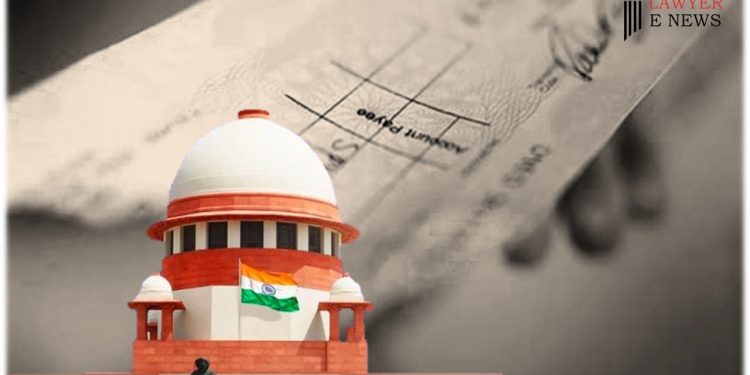Criminal proceedings under Section 138 of N.I. Act can continue during IBC proceedings, rules Supreme Court

On 15th March 2023, Supreme Court in Case Titled AJAY KUMAR RADHEYSHYAM GOENKA vs. TOURISM FINANCE CORPORATION OF INDIA LTD., stated through Justice J.B. PARDIWALA,
“(a) After passing of the resolution plan under Section 31 of the IBC by the adjudicating authority & in the light of the provisions of Section 32A of the IBC, the criminal proceedings under Section 138 of the NI Act will stand terminated only in relation to the corporate debtor if the same is taken over by a new management.
(b) Section 138 proceedings in relation to the signatories/directors who are liable/covered by the two provisos to Section 32A(1) will continue in accordance with law.”
Facts
M/s Rainbow Papers Limited took a loan of Rs. 30 crores from Tourism Finance Corporation of India Limited and issued a post-dated cheque for one of the instalments. The cheque bounced due to “Account Closed”. A legal notice was sent under Section 138 of the Negotiable Instruments Act, but the amount was not paid, and a criminal complaint was filed. Later, M/s Neeraj Paper Agencies Limited filed an application for Corporate Insolvency Resolution Process against M/s Rainbow Papers Limited, which was admitted by the National Company Law Tribunal.
In the NIA proceedings, the Metropolitan Magistrate dismissed the application of the Appellant for exemption from personal appearance on 12.11.2018. This was based on the NCLAT’s observation in Shah Brothers Ispat Pvt. Ltd. Vs P. Mohan Raj &Ors that the proceedings under Section 138 of the NI Act, 1881 were penal provisions and would not come within the purview of Section 14 of the IBC. The Appellant then filed an application for discharge of the complaint case, which was dismissed by the Metropolitan Magistrate on 01.11.2019. The Criminal Revision Petition filed by the Appellant was also dismissed by the High Court, and the Appellant was ordered to pay a cost of Rs. 20,000/- to the Respondent. The Appellant is now seeking to challenge this order.
Arguments
The appellant argued that once a legally enforceable debt is extinguished under the IBC, the basis of Section 138 of the NI Act disappears, and the proceedings under Section 138 of the NI Act should not be permitted to continue. The appellant also argued that the nature of the proceedings under Section 138 of the NI Act is compensatory in nature and the punitive element is incorporated only to enforce the compensatory provisions. Lastly, the appellant argued that if the debt of the company is resolved, the payment would be governed under the Resolution Plan, and if the debts are not resolved, then the assets of the company are to be distributed in terms of Section 53 of the IBC.
The Respondent argued that the cheque was given as repayment for a loan of Rs.30 crore, which was to be repaid in two installments with interest at 15% per annum. The accused company, along with the Appellant, had intentionally given the cheque to defraud the Respondent and had closed the bank account to usurp the loan amount. The Appellant, being the signatory, was directly liable along with the accused company and was actively involved in the company’s affairs as evident from the loan agreement signed by him.
Observed and Held
The court stated that the proceedings under the Insolvency and Bankruptcy Code (IBC) and the proceedings under Section 138 of the Negotiable Instruments Act (N.I. Act) have different scopes and natures, and they do not interfere with each other. The court held that Section 14 of the IBC, which requires certain proceedings to be kept in abeyance during the pendency of IBC proceedings, does not include criminal proceedings such as those under Section 138 of the N.I. Act. The court rejected the argument that the proceedings under Section 138 should be considered civil proceedings rather than criminal proceedings, stating that they are penal in character and can result in imprisonment or fines.
The Supreme Court observed that the issue at hand is whether the proceedings under the N.I. Act can continue simultaneously with the proceedings under the Insolvency and Bankruptcy Code (IBC) or not and concluded that the nature of the proceedings under the two Acts are quite different and would not intercede with each other. The court stated that the proceedings under Section 138 of the N.I. Act are penal in character and cannot be taken as akin to civil proceedings. The court also rejected the plea that the Appellant, as the Managing Director, cannot be proceeded against if proceedings against the company come to an end.
AJAY KUMAR RADHEYSHYAM GOENKA vs. TOURISM FINANCE CORPORATION OF INDIA LTD






